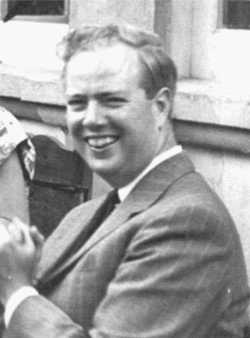

Queer Places:
Harvard University (Ivy League), 2 Kirkland St, Cambridge, MA 02138
2274 Cathedral Ave NW, Washington, DC 20008
Saint Anne's Cemetery
Annapolis, Anne Arundel County, Maryland, USA
 Dorsey Gassaway Fisher (February 12, 1907 - January 12, 1954) was the US
Embassy’s First Secretary in Mexico. The CIA and the US embassy monitored
American dissenters and gays living abroad. The Lavender Scare effectively
arrived in Mexico when officials in Washington targeted American leftists’
ties to Mexican fellow travellers and gay American sexiles in Mexico,
including Dorsey Gassaway Fisher. Indeed, when Fisher was questioned and
threatened with dismissal in 1953 over his ties to the suspected communist
activities in the San Miguel de Allende Art colony, he suffered a fatal heart
attack.
Dorsey Gassaway Fisher (February 12, 1907 - January 12, 1954) was the US
Embassy’s First Secretary in Mexico. The CIA and the US embassy monitored
American dissenters and gays living abroad. The Lavender Scare effectively
arrived in Mexico when officials in Washington targeted American leftists’
ties to Mexican fellow travellers and gay American sexiles in Mexico,
including Dorsey Gassaway Fisher. Indeed, when Fisher was questioned and
threatened with dismissal in 1953 over his ties to the suspected communist
activities in the San Miguel de Allende Art colony, he suffered a fatal heart
attack.
Dorsey Gassaway Fisher was born in Fort Leavenworth, Kansas, the son of Col Roland Earle Fisher and Ellen Brewer Gassaway. Fisher entered the Foreign Service in 1929, after graduating from Harvard University. He was assigned to posts at Calcutta, El Salvador, Havana and Mexico City. From 1937 to 1941, during one of several tours of duty, he was in the Division of Current Information at the State Department.
In 1941 he was appointed Second Secretary in charge of press relations at the American Embassy in London, a position he held until 1946. His last post was Madrid.
He was a member of the Order of the Cincinnati.
Although openly homosexual intellectuals were driven from government posts since the 1930s, the Mexico City stage, newspapers and radio programmes nonetheless discussed homosexuality between the 1930s and 1960s with some regularity. Newspapers’ cultural supplements discussed popular sexology and psychoanalytic texts on homosexuality by Kinsey, Krafft-Ebing, Maranon, Freud and Adler, as well as homophile texts like Edward Sagarin’s The Homosexual in America: A Subjective Approach (1951), which presented homosexuals as a persecuted minority and appeared in Spanish a year after its English release. Salvador Novoa referenced the Kinsey report in a 6 May 1948 newspaper column – giving its title in English – one year before its publication in Spanish. Plays with homosexual themes, including Tennessee Williams’s ‘A Streetcar Named Desire’ (1947) and Sergio Magana’s ‘The Signs of the Zodiac’ (1950), appeared on Mexico City stages through the effort of closeted diplomats like Dorsey Fisher. In addition, the press regularly reviewed homosexual novels from the 1940s to the 1960s, such as Charles R. Jackson’s Fall from Valor (1946), James Baldwin’s Giovanni’s Room (1956) and John Rechy’s City of Night (1963). Novo promoted the aesthetic value of gay literature from his weekly column and celebrated the achievements of Gide, Proust, Waugh and others, establishing a homosexual literary genealogy that invoked Novo’s 1934 homophile manifesto, Le troisieme Faust. Novo proclaimed Rechy’s novel an important text, and observed that it flew off the shelves of Mexico City’s English-language bookstores.
My published books: